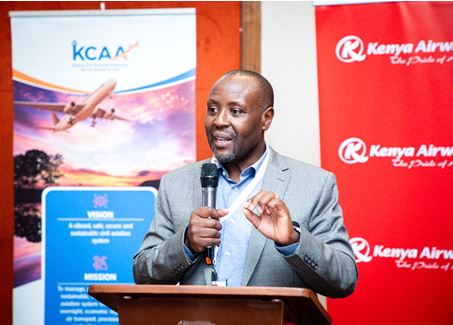By Juliet ETEFE, Nairobi Kenya ([email protected])
Chief Executive Officer-Kenya Airways, Allan Kilavuka, has emphasised the urgent need for African nations to consolidate their aviation assets and unlock the sector’s potential as a driver of economic growth.
Drawing comparisons to Europe and Asia, Mr. Kilavuka argued that Africa should follow global examples of airline consolidation to build sustainable and competitive airlines.
He said this while highlighting the successes of airline giants like Air France, KLM and Lufthansa Group, which have expanded through partnerships.
He stressed that similar consolidation is necessary for Africa to overcome fragmentation and inefficiencies that hinder regional carriers, thus enabling the sector to contribute meaningfully in economic development.
“We need to consolidate aviation assets. That is why you heard us at the beginning of my tenure in this company talking about the Pan-African Airline Group.
The dream is still alive because it is important for Africa for us to consolidate, for us to come together and build airlines that are sustainable. Being sustainable means you have a bigger scale. We need to come together and build airlines that are sustainable.
By sustainable, I mean having the right scale,” he stressed when addressing journalists at the Kenya Airways’ Media Lab 101 held in Nairobi, Kenya.

He reiterated that consolidation is extremely urgent, saying: “We are already falling behind. Every time I see a new airline being set up I cry, because we are going the opposite direction. What we really, as Africans, should be talking about is how do we come together.”
High operating costs stifling African airlines
Commenting further on the sector, the CEO outlined challenges facing African airlines, including high cost of operations and political interference which contributes to the aviation sector’s struggles.
He said cost of operations is estimated to be about 40 percent more expensive than in other parts of the world due to several factors, including inadequate and poor infrastructure.
He explained that in some airports, airlines have to fill gaps by purchasing firefighting equipment or hiring security personnel to ensure safe operations; and these additional expenses drive up costs significantly.
“The cost of operating in Africa is extremely high. The estimate is about 40 percent higher than any other place in the world for very many reasons. One is poor infrastructure. So, sometimes airlines contribute money and buy a firefighting machine to enable them operate in those jurisdictions.
In other instances, you find that they do not have sufficient security personnel. Now, there is also one tiny matter called management…and management is linked to something called political interference,” he bemoaned.
In view of this, he urged governments to appoint professional managers and allow them to run airlines efficiently – adding that interference undermines sustainability.
Catalyst for economic dev’t
Mr. Kilavuka also holds strongly that African governments must start to view aviation as a catalyst for economic development rather than an elitist industry.
“Aviation is heavily taxed because it is seen as a luxury. But empirical evidence shows that reducing taxes on aviation encourages more people to fly, which can increase tax revenues overall,” he said.
He also stressed the need for African airlines to embrace data-driven decision-making and technology integration to enhance customer experience, while advocating the adoption of biometric systems to streamline airport processes and minimise travel-stress for passengers.
“A seamless travel experience is what we need, and technology will play a crucial role in achieving that,” he stated.
Kenya Airways recovery strategy and challenges
Speaking on the state of Kenya Airways, Kilavuka acknowledged that the airline has faced financial difficulties since launching Project Mawingu in 2012.
The ambitious growth plan aimed to expand the airline’s scale but faltered due to various challenges – including travel advisories, infrastructure issues and the COVID-19 pandemic.
In response, the airline introduced Project Kifaru: focusing on operational efficiency, cost rationalisation and cultural transformation within the company. Mr. Kilavuka emphasised that cost-saving measures remain a priority, noting that “every dollar, every shilling counts” in aviation.
However, he disclosed that funding challenges have slowed Kenya Airways’ recovery. Although government initially committed to funding the recovery plan with support from the International Monetary Fund (IMF), financial constraints forced the airline to rely on internal resources.
Project Kifaru 2.0
The airline recently launched Project Kifaru 2.0, which focuses on balance sheet restructuring, debt reduction and long-term growth strategies.
Mr. Kilavuka highlighted the importance of both organic and inorganic growth, which includes but is not limited to partnerships, acquisitions, and business diversification through ventures like Fahari Aviation and an innovation hub.
Sustainability and environmental responsibility
The CEO also pointed out Kenya Airways’ efforts to improve environmental sustainability, aligning with global aviation targets to achieve carbon neutrality by 2050.
He explained that aviation contributes only about 2 percent of global carbon emissions – but acknowledged the industry’s responsibility to adopt sustainable practices.
He also highlighted the airline’s initiatives, including the production of pyro-diesel from waste plastics for use in ground operations. Additionally, Kenya Airways launched its own branded bottled-water to reduce waste and lower costs.
“This is not just about water – it is about cutting waste and improving brand visibility,” he said.
He further outlined plans to expand afforestation efforts, building on the airline’s existing initiative to plant one million trees in Ngong. “In the next five years, we will plant another 12 million trees; not only to offset carbon emissions but also to restore Kenya’s forest cover,” he added.
KQ 2024 Aviation 101 Media Lab
Kenya Airways successfully concluded the 2024 Aviation 101 Media Lab, a five-day event designed to equip journalists from across Africa with knowledge needed to cover the aviation industry accurately.
The programme, held from September 30 to October 4, 2024, provided hands-on training, industry insights and networking opportunities aimed at enhancing aviation reporting across the continent.

Since its inception in 2022, the Media Lab has reaffirmed Kenya Airways’ position as a leader in fostering collaboration within the aviation sector; reinforcing the airline’s dedication to connecting cultures, markets and people across Africa.










